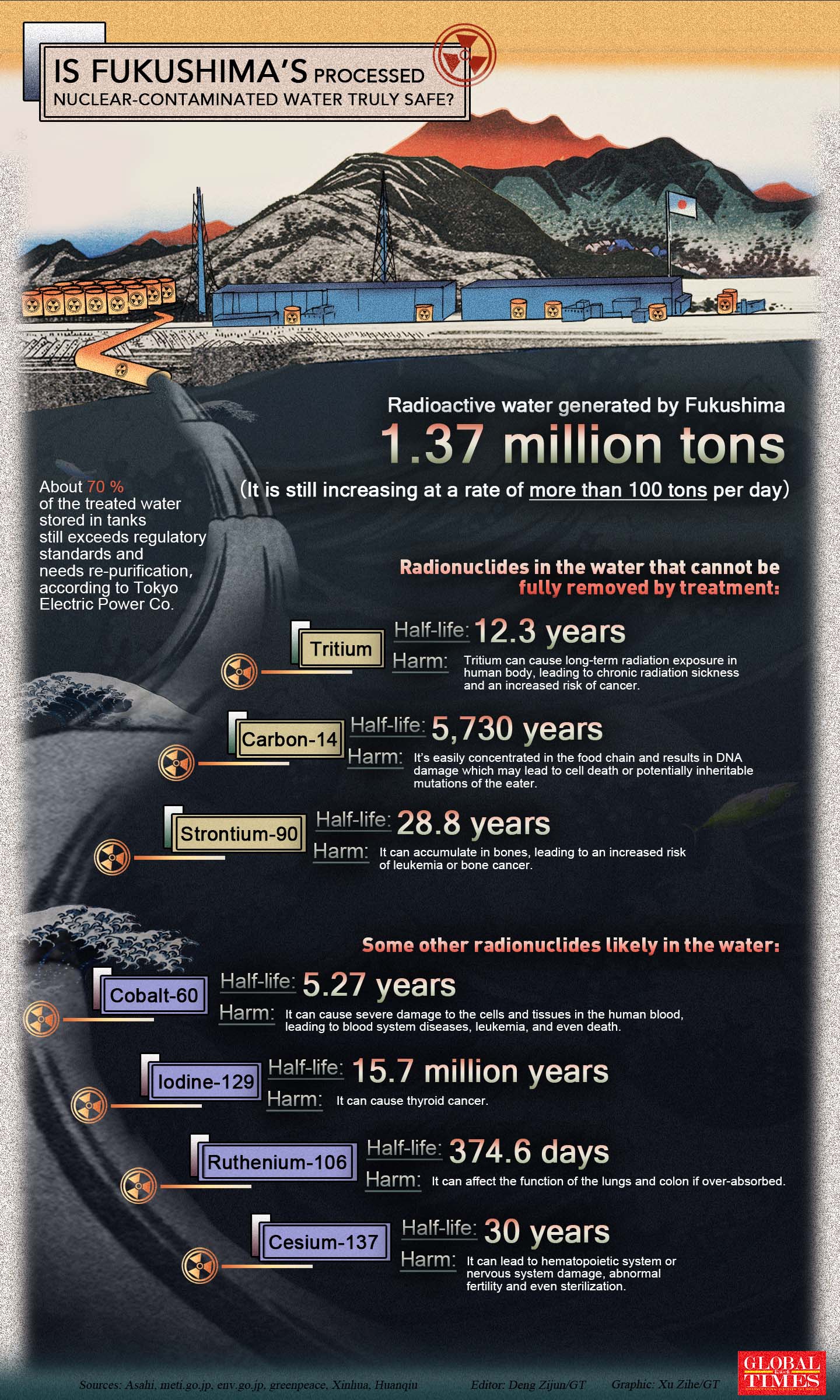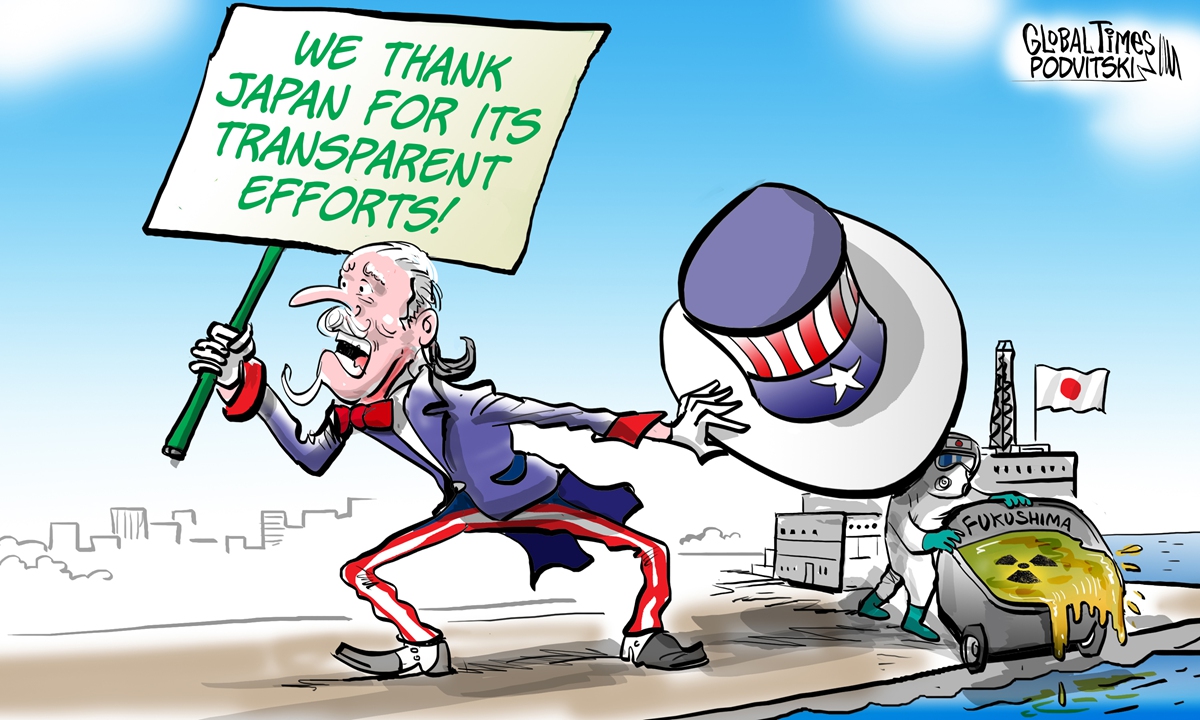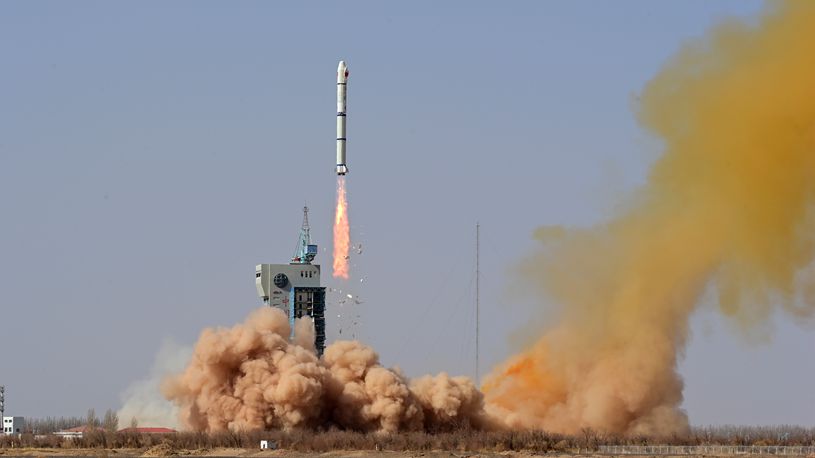How Tokyo Electric Power colluded with Japanese govt to push a plan to dump nuclear-contaminated wastewater?

Graphic: Xu Zihe/GT
Editor's Note:
In the face of the outcry from the international community, serious concerns expressed by neighboring nations and strong opposition even from the Japanese society, Japan remains headstrong in carrying out its plan to dump nuclear-contaminated wastewater into the Pacific Ocean. This irresponsible and selfish decision has drawn widespread criticism which the Japanese government has chosen to ignore. In this series, the Global Times will closely look into how this decision was made, what impact it will have on the environment and people's health, as well as the political deals made and lobbying work done by the Japanese government with Western countries. In the first installment, the Global Times conducted a comprehensive investigation into the collusion between the Tokyo Electric Power Company and the Japanese government behind nuclear-contaminated wastewater dumping plan.
Saturday marks the 12th anniversary of the Great East Japan Earthquake and Tsunami in Fukushima which triggered a nuclear disaster that still haunts the region until today.
In disregard of regional countries' interests and human health, the Japanese government still proceeded with the plan to dump nuclear-contaminated wastewater into the ocean.
Such irresponsible behavior aroused fear and a strong backlash from home and abroad.
On Saturday, multiple parties in Japan have released their statements concerning the issue. The Japanese Communist Party said they strongly protest that the Kishida administration is bringing the countercurrent to reconstruction, namely, the return to nuclear power, and demand the government to withdrawal its decision. Japanese Social Democratic Party said Japan must never return to the path of dependence on nuclear power.
In Tokyo, near Tokyo Electric Power Company (TEPCO) headquarters and the Japanese prime minister's official residence, Japanese residents held a protest rally, demanding that the government and TEPCO cancel plans to dump the nuclear-contaminated wastewater into the sea and use other ways to keep the water on land.
A day ahead of the anniversary, during another rally in front of the office of the Japanese Ministry of Economy, Trade and Industry, former Japanese prime minister Naoto Kan and Social Democratic Party leader Mizuho Fukushima delivered a speech. Mizuho said that the nuclear-contaminated wastewater must not be discharged into the sea and radioactive materials must be centrally managed.
However, the Japanese government has turned a deaf ear to the issue. Japanese Prime Minister Fumio Kishida visited Fukushima Prefecture on Saturday on the anniversary. In January, Kishida said that the nuclear-contaminated wastewater from the crippled Fukushima No. 1 nuclear power plant would be dumped into the ocean between spring and summer this year.
The Japanese government approved the discharge into the ocean of more than one million tons of irradiated water after treatment in April 2021.
"Currently, the US and most of European countries turn a blind eye to the nuclear-contaminated wastewater dumping issue. This is a manifestation of the realist politics in the West. But in fact, the major oceans of the world are all connected, and the people of the US and European countries who remain silent now will surely bear a heavy price in the future," Zhou Yongsheng, deputy director of the Japanese Studies Center at China Foreign Affairs University, told the Global Times on Saturday.

Game of lies. Illustration: Vitaly Podvitski/Russia
Dubious connection
Based on the findings of a Global Times investigation, it would appear that the TEPCO, owner of the Fukushima Daiichi nuclear power plant, shares shady connections with the Japanese government.
The TEPCO was once Japan's biggest power utility and one of the world's largest private nuclear power producers.
According to the Japan Times, in July 2012, after the Fukushima nuclear disaster, in order to save TEPCO which was swamped by disaster-related debt, Japanese government effectively nationalizes the company by injecting one trillion yen of taxpayers' money in exchange for initially acquiring 50.11 percent of TEPCO's voting rights, seeking management changes in the form of government-led.
"After the accident, the Japanese government and TEPCO were already on the same rope. The Japanese government took over TEPCO and had to take care of the aftermath for TEPCO," Zhou told the Global Times.
"For the Japanese government, dumping nuclear-contaminated wastewater into the sea is the easiest and most economical approach," Zhou said, explaining that electrolysis, chemical reduction, and distillation methods for treating nuclear-contaminated wastewater require significant financial investment, in addition to long-term technical research.
Zhou noted that the Japanese government is not willing to pay the huge cost, and has been clear about the decision for a long time, but it has not been truly implemented due to the huge pressure of public opinion. "This time, the Japanese government wanted to act quickly and put it into action as soon as possible."
Zhou said that even before the accident, TEPCO enjoyed close ties with the Japan's Agency for Natural Resources and Energy, and the company often paid high salaries to retired senior officials from the agency.
"In the past, TEPCO was ostensibly a safe energy producer, but in reality, minor accidents did occur from time to time, but these accidents were largely minimized by the officials of the related agencies who were responsible for inspecting the company's nuclear power safety," Zhou said.
According to Japan's Nuclear and Industrial Safety Agency, in 2007, TEPCO admitted that it falsified data at its nuclear power plants to cover up problems during government inspections on 199 occasions of its 13 reactors at Fukushima Daiichi as well as Kashiwazaki-Kariwa nuclear plants between 1977 and 2002.
Campaign of lies
To justify its deeds, the TEPCO also launched a campaign to whitewash its behavior of dumping the nuclear-contaminated wastewater and creating a false public impression that the process was controlled and safe.
The TEPCO started cultivating flounder in seawater containing the nuclear-contaminated wastewater from the Fukushima No. 1 nuclear power plant since October 2022, the Yomiuri Shimbun reported.
By showing that these newly spawned flounder had no abnormalities compared with those raised in seawater, TEPCO aimed to demonstrate the safety of the nuclear-contaminated wastewater ahead of the planned dump this spring.
In addition, the Japanese Ministry of Economy, Trade and Industry tried to appeal on the "safety of the wastewater" to younger visitors.
However, in the comment section under a news report by Japanese All-Nippon News Network to justify the dumping of nuclear-contaminated wastewater, Japanese netizens apparently did not buy it and expressed their deep concerns over the wastewater and its harm to health.
"Still, I won't eat [aquatic products polluted by the nuclear-contaminated wastewater]," said a netizen, but the netizen believed that those aquatic products have their market due to the low price.
"Tritium is harmful, so I don't want to eat [food from Fukushima]. Please protect the origins of the aquatic products properly," another netizen urged.
One netizen said they are opposed to the water dumping plan and called for other appropriate measures to deal with the nuclear-contaminated wastewater.
Another said as the government insists in dumping the wastewater into the sea, the residents could do nothing but try their best to protect themselves.
Despite the widespread concerns, TEPCO asserted that the vast majority of radioactive materials can be removed after using a sophisticated filtration process, and that a secondary treatment will be carried out to dilute the tritium concentration in the wastewater to 1/40th of the Japanese national standard before the contaminated wastewater enters the sea.
However, Zhou pointed out that this is a self-deceiving and misleading statement.
There is no international precedent for such a large scale and excessive concentration of nuclear wastewater discharge into the sea, Zhou noted.
At the same time, the nuclear-contaminated wastewater dumped from the Fukushima Daiichi is different from the wastewater discharged during the normal operation of a nuclear power plant. There are fundamental differences between the two.
Much of the nuclear wastewater from the Fukushima power plant came into contact with the melted nuclear fuel, the radioactive substances contained in the water are extremely complex, and it is highly doubtful as to whether radioactive substances other than tritium can be completely removed from the water, according to Zhou.
"If the Japanese government dumps nuclear-contaminated wastewater into the ocean and causes the marine environmental pollution, it should bear the corresponding responsibility under international law," Zhou said.
"But at present, the relevant international conventions are vague, and there is no clear responsibility. In addition, the wastewater is not all spilled into the Pacific Ocean all at once, but slowly dumped into the ocean over a long period of time. This may not cause much of a stir at first, but this harm will be gradual, and the international community can neither monitor nor restrain the negative impacts," Zhou warned.
Photos
Related Stories
- Japan's nuke wastewater discharge plan batters fishermen's livelihoods, angers global community
- Interview: Japan's contaminated wastewater discharge plan inappropriate, says Japanese scholar
- Japan's GDP growth downgraded to annualized real 0.1 pct in Q4 2022
- Game of lies
- Japan to uphold key postwar apology: PM
- Japan's decision to discharge radioactively contaminated wastewater into Pacific Ocean is dangerous
- Interview: World concerned over Japan's nuclear-contaminated water disposal plan, says Turkish expert
- Child suicides, abuse cases in Japan hit record high in 2022
- Japanese gov't says bird flu cull to top 15 million this season
- Fatal accidents by elderly drivers in Japan rise in 2022 for 2nd year
Copyright © 2023 People's Daily Online. All Rights Reserved.









